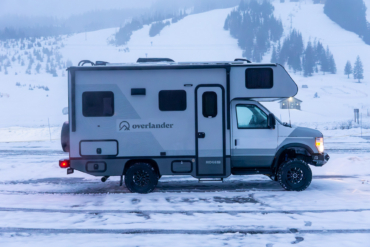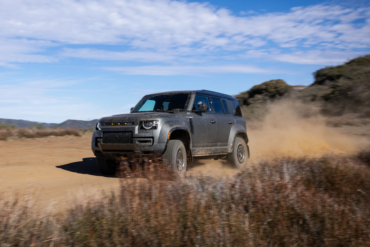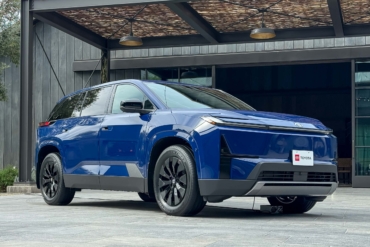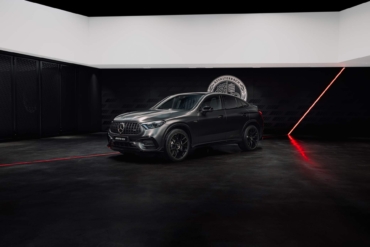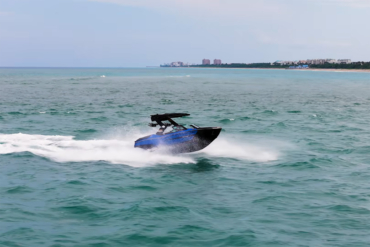This fabric camper concept has us wondering just what the future holds. The virtual-reality collaboration between The North Face and BMW’s Designworks demonstrates a possible application of the wild new fabric FUTURELIGHT.
The future of camping may be a waterproof soft-shell camper trailer, a veritable tent on wheels. Unveiled to media and industry today in Las Vegas at the largest technology trade show in the world, the FUTURELIGHT Camper merges The North Face’s tent design with BMW’s motor and design prowess to create one of the most advanced camper units we’ve ever seen — through a virtual reality (VR) headset.
The North Face released FUTURELIGHT on January 8. According to the brand’s independent testing data, the radical “nanospun” fabric is the most breathable fabric we’ve heard of by a long shot. It will be available in a range of TNF shell products in fall 2019.
And in one of the least predictable collaborations yet, The North Face and Designworks released a concept camper trailer at this year’s Consumer Electronics Show (CES) in Las Vegas. The brands created The FUTURELIGHT camper so that people can begin to imagine the future of protection from the elements. This takes TNF from a leading apparel and outdoor brand to a true technology company.
That’s why it chose to release this new tech at CES as opposed to the Outdoor Retailer show in Denver in three weeks, according to brand representatives.
Fabric FUTURELIGHT Camper
The camper builds on The North Face’s iconic geodesic dome tent frame, with rugged wheels and a travel-ready interior. The brand stretched FUTURELIGHT fabric over the exoskeleton to demonstrate its application beyond just apparel.
Unfortunately, the concept is currently just a VR experience at the CES show. Nonetheless, the camper’s existence, as imaginary as it may be, shows what’s on both brands’ minds.
“Thinking about extreme performance in new and unexpected ways from our experience of working across multiple industries helped us provide consumers with a unique and never-before-seen insight into the very heart of the material and its key attributes,” said Laura Robin, Designworks LA studio director.
“The North Face has actually had a longstanding relationship with Designworks, and this was a chance to showcase what is possible with this new technology,” said Scott Melin, TNF global GM of mountain sports. “We started from ground zero with the goal of completely disrupting what is possible in waterproof-breathable fabrics and sustainable production, building our own factories in three different countries.”
The North Face Campervan in Person: CES 2019
Walking into the cavelike backlit booth adjacent to the self-driving BMW innovation center in the sprawling show (which dwarfs Outdoor Retailer) was walking into the future. The anticipation was palpable. TNF reps were eager to show off a years-long project.
After getting the initial rundown on the breathability and materials innovation in FUTURELIGHT, they escorted me to a dark row of cozy chairs and a VR headset.
Comfortable? Now take these joysticks in your hands and relax. The VR show comes to life. A panoramic view floats in front of my eyes as I sink back into my seat.
Not easily impressed by technology mimicking a true outdoor experience, it took me a minute to relax. Then the awe set in. The more I looked around and enjoyed the virtual camper trailer on a wintery mountain pass, the more I relaxed.
“Take your time and enjoy it,” the technician told me as if leading me on a guided Ayahuasca trip. He probably read my facial expression as my mouth dropped.
I changed the scene from day to night and traveled from inside the camper to outside and into the landscape and back just by pointing the joystick at floating icons. I surveyed the landscape and the surreal details including sleeping pads, insulated water bottles, lanterns, and a crackling fire. The experience produced the most calming and realistic setting I had ever experienced short of an actual alpine campout.
Was I able to experience the actual benefits of FUTURELIGHT? No. But the simulation provided a glimpse into the future of outdoor living. It also alluded to the technological marvels possible when two category leaders come together to instigate change.






